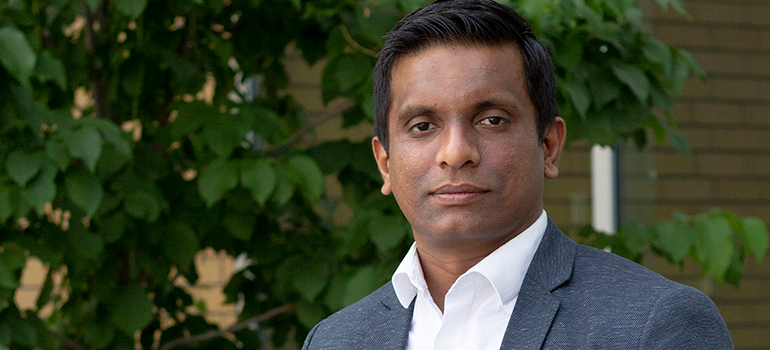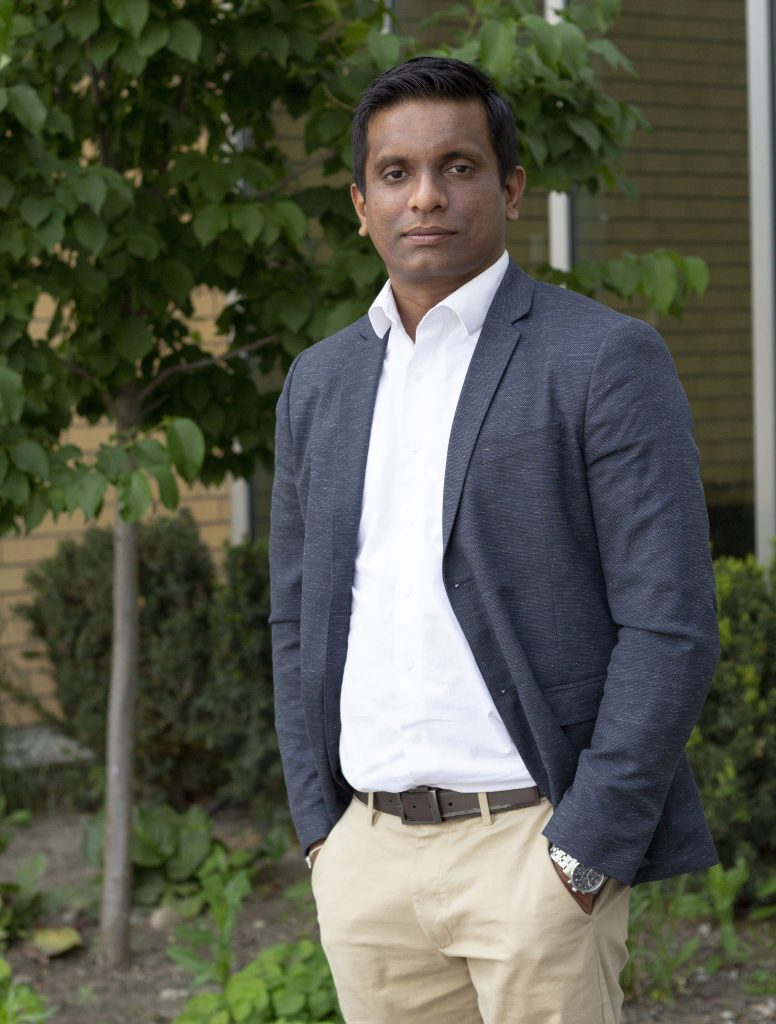Rajeev Ruparathna is a graduate of the University of British Columbia’s Okanagan campus School of Engineering and an assistant professor at the University of Windsor.
“It was destiny.”

What brought you to UBC Okanagan?
I think it was destiny. I consider myself lucky to pursue my graduate studies at UBC Okanagan under the supervision of Dr. Kasun Hewage. I obtained my Bachelor of Science degree in engineering from the University of Moratuwa, Sri Lanka, in 2008. During my undergraduate studies, I was particularly interested in construction and project management, and I was determined to pursue my career in this area. I got some unique opportunities after graduation to work in various capacities in both public and private sectors in Sri Lanka. I worked as a procurement engineer at the project management unit of “Dam Safety and Water Resources Planning Project of Sri Lanka”, which was one of the main large scale projects in the country. Following this, I worked as the engineering project manager of a large-scale financial institution in Sri Lanka, where I managed their building infrastructure in all parts of the country. Incidentally, my work as an engineer in Sri Lanka provided me with the background to define my postgraduate research.
Pursing graduate studies had always been at the back of my mind. I wanted to pursue my graduate studies in construction and project management. In 2009, I found out that Dr. Kasun Hewage was looking for graduate students for his research program. I directly contacted Dr. Hewage and he was kind enough to accept me as a MASc student under his supervision. I started my MASc at UBC Okanagan in the Fall of 2011.
Describe the research you did with Dr. Hewage?
From 2011, I have been a member of the Life Cycle Management (LCM) Research Group at UBC Okanagan’s School of Engineering. The group was formed by Dr. Kasun Hewage and Dr. Rehan Sadiq. I pursued my MASc, PhD and Postdoctoral research under the supervision of Dr. Hewage.
Even more importantly than the research supervision he provided, Dr. Hewage had the correct formula to mould a future academic. First, Dr. Hewage provided me the freedom to define my research by myself. I defined my MASc and PhD research based on my work experience and I received amazing guidance from Dr. Hewage. For success in research, you have to be passionate about the subject-matter. I feel this is the cornerstone for a successful academic career. Second, I got the chance to work with Dr. Rehan Sadiq through Dr. Hewage. They mentored me, and above all, provided me with the right opportunities to expand my knowledge. I sincerely believe that I was able to publish 16 journal articles mainly because of this guidance. Third, I got the opportunity to get involved in multidisciplinary research projects which enabled me to expand my areas of expertise to various disciplines on green procurement in commercial construction, water-energy nexus based sustainable urban planning, green building infrastructure, municipal solid waste management, public infrastructure management, and renewable energy integration.
What are some of your fondest memories from being at UBC Okanagan?
Working at the Life Cycle Management Laboratory was the most memorable time at UBC Okanagan. I enjoyed working in a challenging and demanding work environment. I met some amazing people over here. I believe the culture we share at the LCM laboratory is unique and I am glad to be a part of this. Living in Kelowna has been memorable. My wife, Kaushalya and I could never think of a better place to live.
 How have your studies at UBC Okanagan prepared you for your new role at Windsor?
How have your studies at UBC Okanagan prepared you for your new role at Windsor?
I received the best training one could receive as a graduate student. The training expanded beyond research and teaching. It is important to develop a set of soft-skills that will complement research and teaching. Hard work and dedication are the universal formula for success. If you keep working hard you will achieve things far greater than what you had envisioned.
Through my involvement in numerous projects in research and industry, I developed a capacity to lead multidisciplinary teams with experts from a variety of backgrounds. I gained a practical sense with regards to civil engineering applications through my field experience.
Those aspects alone are not sufficient in preparing a good academic with the right qualities and mindset. You need to be empathetic about your colleagues and should be ready to give them a hand if they need assistance. You have to treat everyone in a fair and equal manner. I think that combining a great work ethic with strong morals makes a great academic. You need to be a good observer to learn and absorb these qualities through your day-to-day work. I consider myself lucky as I could emulate what I observed from Dr. Hewage and Dr. Sadiq.
What type of research are you doing at the University of Windsor?
My work will primarily be on Building Information Modelling (BIM). This is the dawn of data age in the construction industry. BIM is currently creating a revolution in the construction industry. I plan to work on integrating BIM concept in the construction industry. I believe my background in construction management and life cycle thinking will help me in this regard. I am planning to develop several courses in this area to strengthen the undergraduate and graduate programs.
Furthermore, I would like to create research collaborations with UBCO as well as with other universities. In a nutshell, I want to use state-of-the-art–technology to seek economically viable, socially acceptable, and environmentally sustainable solutions in the construction industry.